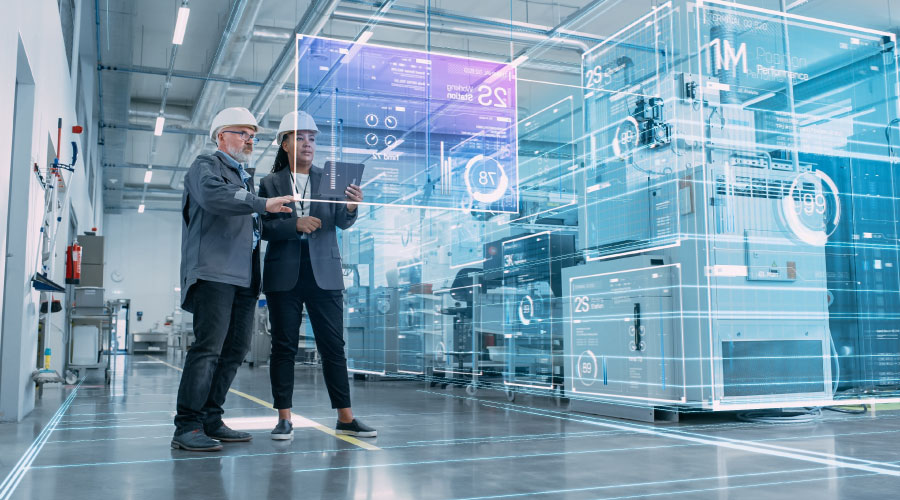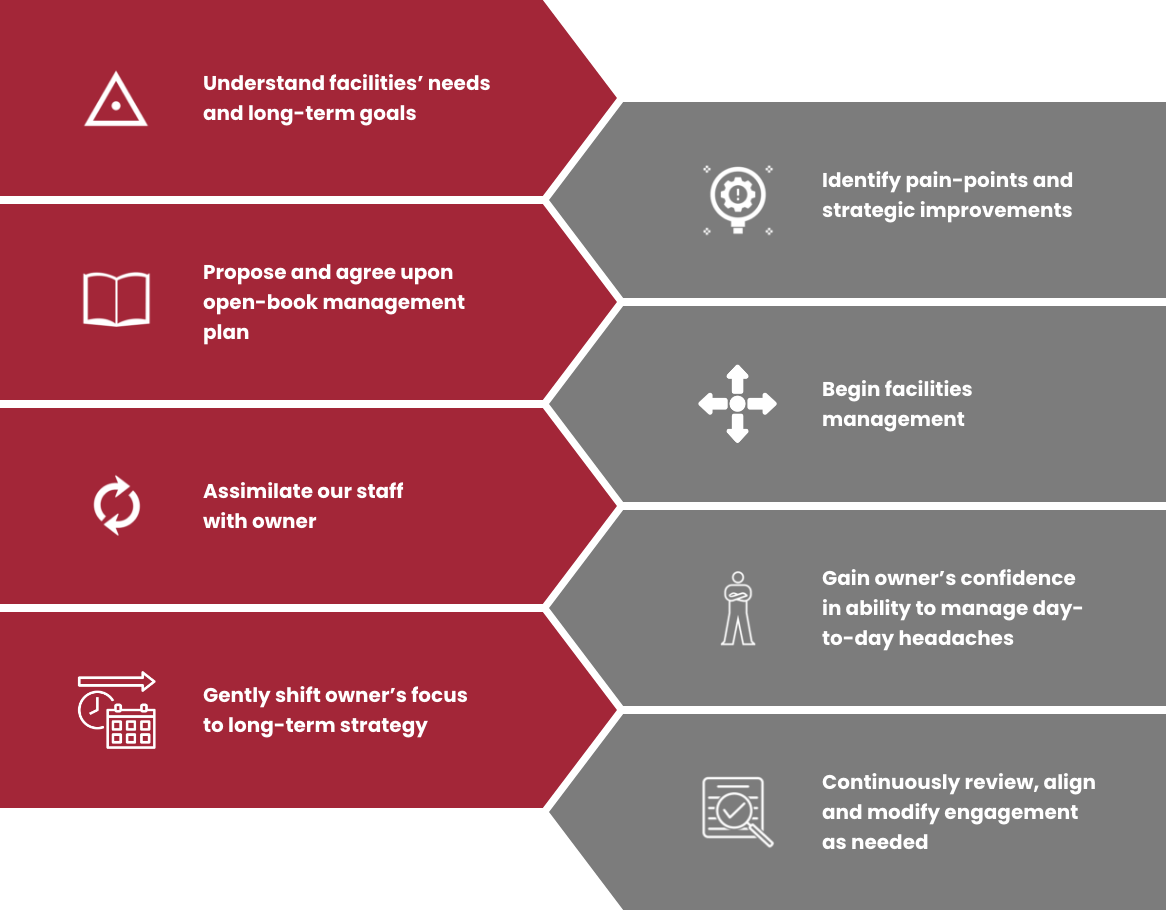The Role of Facility Management in Sustainable Procedures
The Role of Facility Management in Sustainable Procedures
Blog Article
Trick Patterns Forming the Future of Facility Management in 2024
As we look in advance to 2024, the landscape of facility management is poised for significant transformation, driven by several crucial fads. The integration of smart structure technologies and a shift in the direction of data-driven decision-making assurance to boost operational efficiency while focusing on sustainability in method.
Smart Structure Technologies

Smart structure modern technologies include a wide range of systems, including smart illumination, HVAC controls, and safety and security systems. By integrating these systems, facility managers can check and change criteria in real-time, leading to considerable reductions in power waste and operational costs. Smart sensors can discover occupancy degrees and adjust illumination and temperature accordingly, making sure that energy is just used when required.
Additionally, these modern technologies facilitate enhanced information collection, permitting organizations to track usage patterns and determine possibilities for additional improvements. The implementation of clever building modern technologies not only contributes to sustainability objectives yet additionally creates healthier workplace that can boost worker performance and complete satisfaction.
As we relocate into 2024, the fostering of wise structure modern technologies will likely increase, showing a broader change in the direction of more smart, receptive, and sustainable facility management techniques.
Data-Driven Choice Making
Progressively, organizations are leveraging data-driven decision making to boost center management methods. By using data analytics, facility supervisors can obtain actionable understandings that dramatically boost operational performance and resource allotment. The integration of sophisticated technologies, such as IoT sensing units and real-time surveillance systems, enables the collection of vast quantities of information on building performance, tenancy prices, and energy intake.
This wealth of details permits facility managers to recognize patterns, forecast maintenance requirements, and proactively address concerns before they escalate. Anticipating analytics can forecast devices failings, minimizing downtime and repair work expenses. In addition, data visualization tools facilitate better interaction among stakeholders, making sure that educated choices are made collaboratively.
Additionally, data-driven strategies improve tactical preparation by making it possible for center managers to analyze the effectiveness of present practices and make educated options relating to financial investments in innovation or framework. As companies progressively prioritize operational quality, data-driven choice production is poised to become a foundation of successful facility management approaches in 2024 and beyond. Inevitably, the ability to leverage data properly will encourage companies to create extra efficient, effective, and resilient centers.
Sustainability and Green Practices
The emphasis on data-driven choice making naturally straightens with the expanding focus on sustainability and eco-friendly practices within facility management. As companies increasingly prioritize ecological duty, facility managers are leveraging analytics to maximize resource usage, decrease waste, and reduce carbon impacts. This strategic approach makes it possible for the assimilation of energy-efficient systems, such as LED illumination, smart a/c controls, and renewable resource resources into center operations.
Moreover, the execution of sustainable methods prolongs beyond energy usage. Center managers are promoting and taking on eco-friendly materials recycling efforts to develop a round economic climate within this post their facilities. This not just boosts the environmental account of the organization however likewise promotes a society of sustainability among staff members.
Compliance with environmental regulations is an additional important facet driving the adoption of eco-friendly methods. By utilizing information analytics, center supervisors can check conformity metrics and determine locations for renovation, making certain adherence to worldwide and neighborhood sustainability standards.
Hybrid Job Models
A significant shift in the direction of hybrid job versions is improving the landscape of facility monitoring in 2024. This paradigm combines remote and in-office job, demanding a reevaluation of area application, resource allotment, and employee involvement strategies. Organizations are progressively acknowledging the significance of versatile workspaces that provide to varied requirements and preferences.
Center supervisors must adjust by implementing functional office styles that support joint initiatives while giving locations for concentrated job. This consists of the combination of technology to promote seamless interaction and partnership among remote and in-office workers. Smart building solutions, geared up with analytics and sensing units, permit real-time monitoring of space use, allowing companies to enhance their settings effectively.
Furthermore, crossbreed job models emphasize the demand for reliable facility monitoring that prioritizes worker experience. In essence, the crossbreed job design is changing facility management, urging a proactive approach content to fulfill the developing demands of the labor force.
Improved Owner Health
As companies accept hybrid job models, an enhanced focus on owner wellness is becoming important to center management strategies. Facility Management. This shift recognizes that a completely satisfied and healthy labor force straight affects efficiency and retention rates. Facility managers are currently focusing on environments that advertise physical and psychological well-being, integrating aspects such as natural lights, biophilic style, and available wellness resources

Modern technology plays a vital duty in this advancement. Smart structure systems can monitor ecological aspects and adjust settings in real-time, ensuring optimal comfort levels - Facility Management. Responses devices, such as occupancy sensing units and employee studies, allow facility managers to consistently improve wellness efforts based on resident requirements.

Verdict
In 2024, the future of center monitoring will be dramatically affected by the integration of smart building innovations and data-driven decision-making, cultivating improved operational performance. Sustainability initiatives will prioritize environmentally friendly practices, while the development of crossbreed job designs will certainly necessitate adaptable office designs. In addition, an enhanced concentrate on occupant health via sophisticated cooling and heating systems and biophilic layout will certainly add to much healthier workplace. These trends jointly highlight the evolving landscape of center monitoring in action to contemporary obstacles and opportunities.
Center managers are advertising and taking on environment-friendly materials reusing efforts to develop a round economic situation within their centers.A substantial change in the direction of hybrid work designs is improving the landscape of center administration in 2024.In addition, hybrid content job designs stress the need for effective facility monitoring that focuses on staff member experience.As companies accept hybrid job versions, a heightened emphasis on owner health is coming to be indispensable to center monitoring methods.In 2024, the future of center administration will be dramatically influenced by the integration of smart building innovations and data-driven decision-making, fostering enhanced functional performance.
Report this page